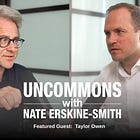It’s been a wild week in Ottawa with the release of Budget 2025 and chaos in the Conservative ranks.
Here’s a rundown with what I see as the good, the bad, and the ugly in Budget 2025. In short, it meets the moment in part, on questions of sovereignty and spurring economic growth. At the same time, it fails to live up to its promise of generational investments.
You can read the full text of my budget response further below.
Upcoming events
First, I want to make sure you’re aware of a few upcoming events in our east end:
Remembrance Day services: 11 am at the Kew Gardens cenotaph and at the East York Civic Centre, 1 pm at Branch 345 on Peard, and 2 pm at the Naval Club.
Beaches Santa Clause Parade: Sunday November 16 at 1 pm, starting at Kingston and Victoria Park. Thanks to Centre 55 for making it happen.
Uncommons Live with Tanya Talaga, award-winning author and journalist: Wednesday November 19 at 7 pm, at Beach United on Wineva. RSVP here.
Recent Uncommons episodes
Having passed legislation to ban the captivity of whales and dolphins, there remains the important question of what will happen to the animals still at Marineland. In this episode, I speak to a former Marineland trainer turned Whistleblower. And there are also other ideas among those who care about what should come next.
Catherine McKenna joined us for a live event last month to talk about her new book Run Like a Girl, climate (in)action, and the challenge of encouraging good people to join politics when there can be such a nastiness to it.
With a greater emphasis on public safety and border enforcement, we can’t forget about civil liberties and privacy rights. Kate Robertson is an expert at The Citizen Lab at U of T and Adam Sadinsky is with the Canadian Association of Refugee Lawyers.
There’s a broad need for stronger digital governance to better address privacy, competition, and online harms. Taylor Owen is an expert at McGill and founding director of the Center for Media, Technology and Democracy.
If you have ideas for future guests or topics, let me know here: info@beynate.ca
Budget 2025: The Good, the Bad, and the Ugly
I’ve seen the budget described as investment-focused, as austerity, as reckless. Can it be all of those things at once? I won’t go through all 493 pages, I will spare you from that, but here’s a rundown of what I see as the good, the bad, and the ugly from Budget 2025.
Let’s start with the Good.
In the face of threats, the government is rightly prioritizing actions to secure our sovereignty. That includes support for businesses and workers affected by tariffs, a Buy Canada procurement policy, significant new infrastructure spending, and a huge commitment to the Canadian Forces.
There are also smart forward-looking ideas, like the sovereign fund for critical minerals, taking a lesson from Norway. And there are new dollars for innovation and to attract talent and research from the US, whose administration seems intent to run intelligence out of its country.
There are also useful actions to respond to rising youth unemployment, to create a Youth Climate Corps, to support PSWs, to protect the Canada Disability Benefit from taxation, and more.
Lots to like in many ways, and more generally, I welcome the focus on productivity, both to drive economic growth in the private sector and to get the most out of public services. Although, yes, care is required to ensure those efforts don’t go sideways.
Now to the Bad, or more fairly, where expectations were set at a level that we failed to meet, including on the question of generational investments.
First, stalled climate action. I don’t want to be too dismissive here, as the Canadian Climate Institute rightly highlighted the importance of a strengthened industrial carbon price. But apart from that promise, there was nothing new. Yes, we’re moving forward with strong methane rules and clean investment tax credits, and these are key pieces. But we’re also cutting tree planting, moving away from an emissions cap, winding down Greener Homes, and the budget offers no new money for climate action.
On housing, we’ve got the beginnings of Build Canada Homes, a tax cut for new homebuyers, and some dollars for housing enabling infrastructure that are unlikely to move the needle on development charges as much as we’d like. It falls short of the specific promises in our platform, and it unfortunately falls well short of the war-time effort that many of us thought we’d deliver.
The fiscal frame of “spend less to invest more” is actually one that I like. Operational books generally in balance, and capital deficit-spending more easily justified. But the budget adds $140 billion in new spending over 5 years - $90 billion net after savings - and only 36% of the net new spending is capital.
Related, there’s a lot of deficit-financing here to cover non-capital new spending. Honouring our initial 2% commitment to NATO made sense and a middle class tax cut was a platform promise, but these are far and away the two largest financial commitments, they are non-capital, and they should be paid for. And much needed OAS reform - the largest non-capital growing expenditure - still isn’t part of the conversation.
Now, the Ugly, and there isn’t a lot that falls in this category thankfully.
First, we see the budget commit to a new inefficient fossil fuel subsidy for LNG facilities. If there’s a business case for LNG, there’s a business case. We don’t need more public dollars chasing fossil fuels.
Worse, we see major cuts - over 2.5 billion over 4 years - to International Development Assistance. Real Keir Starmer energy that unfortunately caters to a prevailing albeit short-sighted current view among wealthy donor countries. A Pearsonian budget this is not.
Conclusion:
I know these aren’t easy times, and a budget process involves tough choices.
It’s also only a first budget - it can’t be expected to solve all problems. And the devil will be in the details of implementation in many cases - from infrastructure and housing, to innovation spending, to the industrial carbon price, to finding efficiencies in government in a manner that is fair and effective.
Overall, the budget meets the moment in part - on questions of sovereignty and with a focus on spurring economic growth at home. And it’s certainly not a budget that should throw us into an election at such an uncertain time.
But fairly, it does not live up to its promise of generational investments.
I joked with colleagues that it’s a pretty good Progressive Conservative budget. A joke! But hey, some conservatives agree.






While the choice to abandon tree planting is worrying, not building housing under as post war type of program is unacceptable. I see using coop, modular, small houses, rentals geared to income, tiny houses for homeless to relieve housing pressures as table stakes to underpin a healthy economy. Where in the budget is the commitment to food security which influences health of individuals to relieve pressure on our healthcare system.
Please support electoral reform.
Kind Regards
Jack ireland
LNG expansion and new pipelines risk us owning stranded assets. The world is electrifying. There should be more infrastructure projects to support this future.
There is little in the way of value added initiatives.
Why pump away heavy crude diluted with 30% condensate gas when we can develop better solutions?